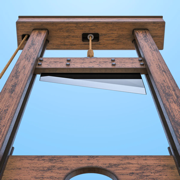|
Lord Tywin posted:Were there any significant difference if you lived under a nobleman or on land ruled by a Prince-Bishop? The real differences for the life of the common individual come in if you are an inhabitant of a city or not, and then further if you are a citizen. If you live in a city (which may or may not be an imperial free city; ie, a city state which has an unmediated relationship to the Emperor) and you are a citizen, you have the right to a say in your city's affairs, through your guild you have a voice in city meetings, you are also liable for the city's defense, and the rest of the city is obligated to support you if you fall on hard times. This is a very different kind of life from that of peasants. EvanSchenck posted:Speaking of 3,000 separate entities, can you discuss imperial knights a little bit? I think they're an interesting little detail in the structure of the Holy Roman Empire and I'm curious what somebody who specializes in the early modern period would have to say about them. jonnypeh posted:Looking for recommended history reading, preferably in the form of kindle e-books, as in something that can be found and bought on amazon.com. Good early modern military history includes:
HEY GUNS fucked around with this message at 02:29 on Jan 14, 2013 |
|
|
|

|
| # ? Jun 10, 2024 10:02 |
|
I picked up a copy of Wilson's book, and it was misprinted. Something like pages 150-200 repeated where 200-250 should have been. A good book otherwise though.
|
|
|
|
the JJ posted:I picked up a copy of Wilson's book, and it was misprinted. Something like pages 150-200 repeated where 200-250 should have been. A good book otherwise though.
|
|
|
|
HEGEL SMOKE A J posted:Seriously? I hope you were able to get a refund or something. I'm just looking at my own right now, and it seems OK. By the time I noticed I was halfway across the country and in the middle of nowhere. And I bought it cheap, with a gift card, from a local independent bookstore. It was a pretty good read anyway. Seemed convincing, though I wasn't sure on how other scholars viewed it. You seem qualified and endorsed it though, so good enough for me.
|
|
|
|
the JJ posted:Seemed convincing, though I wasn't sure on how other scholars viewed it. You seem qualified and endorsed it though, so good enough for me.
|
|
|
|
Rabhadh posted:Allied tankers found it was a lot easier to fire their potato main guns on the move, there by ensuring the first hit in combat, which as we all know is all important. Of course, Allied spud divisions were always imperiled in the field by German potato mashers.
|
|
|
|
Thanks, I'll check some of these out after I'm done with To Rule The Waves. Guess I'll have to order some actual books then (as in not e-books).
|
|
|
|
Are there any recommended alternate history sites around? I've been having fun reading alternatehistory.com for a while but a lot of it is wanky nonsense and there doesn't seem to be much effort to make people provide sources for their theories. Is this just inherent to all alternate history everywhere?
|
|
|
|
ModernMajorGeneral posted:Are there any recommended alternate history sites around? I've been having fun reading alternatehistory.com for a while but a lot of it is wanky nonsense and there doesn't seem to be much effort to make people provide sources for their theories. Is this just inherent to all alternate history everywhere? http://groups.google.com/group/soc.history.what-if/topics?gvc=2 The quality has decreased noticeably over the years but you can still search for, and read, older topics. Anything pre 2002 tends to be well written and knowledgeable in my experience, for the most part.
|
|
|
|
Since there's now a specific WW2 thread, I propose that further discussion of that particular war take place in that thread instead, leaving this thread for non-WW2 military history. http://forums.somethingawful.com/showthread.php?threadid=3528093 Considering maybe half the posts in this thread concern WW2 anyway, vastly overshadowing anything that didn't happen between 1939 and 1945, splitting WW2 discussion off might be a good idea.
|
|
|
|
Might be a good idea yeah.
|
|
|
|
|
I'm not sure if a generic WW2 thread will survive beyond the first "but Hitler had good ideas/communists were ultimately worse/in the end, Dresden and Hiroshima were just as bad as Holocaust/but I like the uniforms, that doesn't mean I'm a Nazi" shitstorm. I... I just feel safer here fake edit: I slipped on Freud and typed "feel safer heer" first 
|
|
|
|
On the other hand it might be preferable to quarantine that stuff in a thread of its own rather than having people come in here every 5 pages or so going I HEARD THE GARAND WON THE WAR FOR THE ALLIES
|
|
|
|
Eh, that thread looks like another Hitler circle jerk. I'll leave the actual history to this thread. Speaking of: With the Persian Empire's massive army, what was the game plan as far as being able to feed that many people goes? Was it something akin to locust just sweeping over southern Europe?
|
|
|
|
What particular Persian Empire are you referring to, and more specifically, what army?
|
|
|
|
Alekanderu posted:What particular Persian Empire are you referring to, and more specifically, what army?  Xerxes era. 400s BC
|
|
|
|
Blckdrgn posted:Speaking of: With the Persian Empire's massive army, what was the game plan as far as being able to feed that many people goes? Was it something akin to locust just sweeping over southern Europe? Or to water them? Dry food is light enough to haul in the supply train but water is much heavier, and much more vital for marching soldiers. Even if the enemy doesn't poison or block all wells, delivering water to a huge army based on water sources that you *might* find among the trail would be a logistical nightmare. Was that what the Persian fleet was there for, to haul food and water supplies?
|
|
|
|
Nenonen posted:I'm not sure if a generic WW2 thread will survive beyond the first "but Hitler had good ideas/communists were ultimately worse/in the end, Dresden and Hiroshima were just as bad as Holocaust/but I like the uniforms, that doesn't mean I'm a Nazi" shitstorm. Ugh, yeah. What I saw of the WW2 specific thread was just...blurg. I couldn't bring myself to say anything, and I've published a paper on one Nazi. Edit: Blckdrgn posted:Eh, that thread looks like another Hitler circle jerk.  HEY GUNS fucked around with this message at 20:12 on Jan 14, 2013 |
|
|
|
We can make it better.
|
|
|
|
jonnypeh posted:Thanks, I'll check some of these out after I'm done with To Rule The Waves. Guess I'll have to order some actual books then (as in not e-books). Wedgewood is so well known that you should be able to find her works in ebook format, though.
|
|
|
|
Alekanderu posted:We can make it better. The abyss shall devour us.
|
|
|
|
steinrokkan posted:The abyss shall devour us.
|
|
|
|
Blckdrgn posted:
|
|
|
|
The Guns of August is written very well.quote:With their relentless talent for the tactless, the Germans chose to violate Luxembourg at a place whose native and official name was Trois Vierges. The three virgins in fact represented faith, hope, and charity, but history with her opposite touch arranged for the occasion that they should stand in the public mind for Luxembourg, Belgium and France.
|
|
|
|
Mans posted:Xerxes had a massive fleet to supply his army. As soon as that naval supply was cut off (Salamis) Xerxes was forced to back off and leave only a small number of forces (well, small is a relative thing, the army was still oissibly tens of thousands strong) in the captured territories of the north. These were eventually defeated in the battle of Platea. Wasn't it really just a gigantic bridge built with ship bits? once the persian fleet protecting it was defeated at salamis they abandoned it. This same tactic was apparently used by the greeks to besiege a carthaginian or phoenician city if i recall, but instead of ships they literally moved earth to create a land bridge. Which was pretty crazy but i guess thats how you attack a strongpoint facing the sea 
|
|
|
|
Fizzil posted:Wasn't it really just a gigantic bridge built with ship bits? once the persian fleet protecting it was defeated at salamis they abandoned it. This same tactic was apparently used by the greeks to besiege a carthaginian or phoenician city if i recall, but instead of ships they literally moved earth to create a land bridge. Which was pretty crazy but i guess thats how you attack a strongpoint facing the sea Are you thinking of Alexander at Tyre?
|
|
|
|
Retarded Pimp posted:Are you thinking of Alexander at Tyre? Pretty sure he's thinking of the bridge Xerxes built across Hellespont. But that was just used for the army to march across, it was destroyed by a storm after they crossed (and before they crossed, but they built another one then).
|
|
|
|
Do we really have people promoting the "1941 Soviet Offensive" theory in the WWII thread?
|
|
|
|
Fizzil posted:Wasn't it really just a gigantic bridge built with ship bits? once the persian fleet protecting it was defeated at salamis they abandoned it. This same tactic was apparently used by the greeks to besiege a carthaginian or phoenician city if i recall, but instead of ships they literally moved earth to create a land bridge. Which was pretty crazy but i guess thats how you attack a strongpoint facing the sea Yeah, Darius built a bridge of boats across the Bosphorus during the Scythian campaign (which had to be dismantled post-haste once Darius and most (but not all) of the army was across to prevent the Scythians from following... Xerxes was the one that had his first bridge destroyed by a storm and responded by beheading the engineers and whipping the ocean into submission before building the second bridge (at least according to Herodotus). Basically they tied boats together with thick cables and then built a roadbed over the tops to march the army across. Alexander built the land bridge to Tyre during his conquest of Persia.
|
|
|
|
Shimrra Jamaane posted:Do we really have people promoting the "1941 Soviet Offensive" theory in the WWII thread? You don't remember DasReich? Here's an exchange you had with him in this thread a while back, about how he didn't believe that Generalplan Ost was a real thing.
|
|
|
|
For the record, what I meant was the dispositions in 1941 are ones traditionally associated with offensive action. I personally never believed the Red Army capable of serious offensive action until late 1942. The purges saw to that. The possibility I subscribe to is that they never were trained on any defense-in-depth doctrine. Edit: As for Generalplan Ost, I learned something from this thread and I'm not ashamed to admit it. DasReich fucked around with this message at 03:29 on Jan 15, 2013 |
|
|
|
DasReich posted:For the record, what I meant was the dispositions in 1941 are ones traditionally associated with offensive action. Tl;dr, no. Soviet troops were massed on the border because Stalin was wondering whether or not the Germans would attack him. (Ironically, when it happened he was caught completely by surprise and flipped out for about a week and a half.) The Nazis had been planning to invade Russia since summer 1940. The major concerns in the surviving documents do not include wondering whether or not Russia would invade Germany and hoping to get the jump on them. That was something Hitler put about after the invasion. It was also theorized by a writer named Suvorov in the 80s, in a terribad book which also claimed that Stalin financed Hitler and engineered the fall of the Weimar republic behind the scenes. Or...something. Note that despite the ambiguity about what Soviet mobilization meant, even historians who propound something like Suvorov's thesis have not produced any documents giving the date of the alleged proposed Soviet attack. Compare that to the reams of material we have from the planning for Barbarossa. HEY GUNS fucked around with this message at 06:02 on Jan 15, 2013 |
|
|
|
IIRC Stalin was given a lot of evidence that the invasion would occur when it did, up to and including Churchill dropping some enigma-related tidbits about German divisions being relocated to the border.
|
|
|
|
Also, DasReich, you're one of the few people I've ever said this to, but I really hate your username.
|
|
|
HEGEL SMOKE A J posted:Ooh lawdy. I thought that it was a foregone conclusion that the Soviets would eventually attack Germany in the short term, just a matter of when. This isn't to suggest that Hitler was forced to launch Barbarossa to defend himself against Soviet aggression but to acknowledge some realities regarding Stalin and longstanding Soviet/Russian territorial ambitions. Also, regarding dates of proposed attacks from the wikipedia article you cited quote:Although the USSR attacked Finland, no documents found to date which would indicate November 26, 1939 as the previously assumed date for beginning of the provocations or November 30 as the date of the planned Soviet assault. I'm clearly no expert on the topic so please dispense some knowledge.
|
|
|
|
|
wdarkk posted:IIRC Stalin was given a lot of evidence that the invasion would occur when it did, up to and including Churchill dropping some enigma-related tidbits about German divisions being relocated to the border. That evidence didn't trickle down at all, sadly. In a large number of memoirs I read, Soviet soldiers mention some kind of task that would reduce their fighting effectiveness the next day: hang the cloth machine gun belts to dry, remove the tank batteries for recharging, stuff like that. A lot of bases were ridiculously unprepared for an attack on that night. Of course, a lot of the soldiers then mention that they were far too lazy to dry all the MG belts or remove all the batteries, which bought them a few precious hours.
|
|
|
|
It was my understanding that it was quite the opposite: Stalin made a deal/non-aggression pact with Hitler because he felt that Nazi Germany could serve as a bulwark against the Western Democracies that just did not like Communism. Russia was, after all, invaded by the UK and other Western nations during the Russian Civil War, and even as recently as the Winter War, Churchill was entertaining thoughts of sending men and materiel to Finland to help them fight off the Soviets. As for the forward deployment of troops along the German-Soviet border, I think that was just function of Soviet offensively-minded doctrine at the time. That is, they weren't revving up to attack Germany, they just assumed that when the attack did come, the Red Army would immediately be able to counter-attack as a response - best defense is a good offense and all that. They did not posture themselves defensively because playing defense wasn't (or wasn't prominent) in their playbook.
|
|
|
|
So in Vietnam, unexploded bomblets from cluster munitions were often used by the VC to make IED's out of. With modern tanks and ERA armor, if a T72 was knocked out, could resourceful rebels use salvaged ERA panels to make weapons out of ?
|
|
|
|
gradenko_2000 posted:It was my understanding that it was quite the opposite: Stalin made a deal/non-aggression pact with Hitler because he felt that Nazi Germany could serve as a bulwark against the Western Democracies that just did not like Communism. Russia was, after all, invaded by the UK and other Western nations during the Russian Civil War, and even as recently as the Winter War, Churchill was entertaining thoughts of sending men and materiel to Finland to help them fight off the Soviets. With Lenin, the defensive strategy was a two-parter: a strong line of fortifications stalls the enemy advance, while well organized teams of partisans assembled in advance would operate in the rear of the enemy and sap their supply lines, damage their communications, etc, eventually causing them to give out and withdraw. With Stalin, the plans changed to a much more optimistic scenario of a rapid counter-attack, a rout of enemy forces, and a war fought mostly on enemy territory. A lot of the partisans, skilled in stealth and explosives, were imprisoned. With the border's movement, the fortifications that the border forces counted on were gone. The Red Army was left without a real defensive plan in 1941. Edit: from what I've read, Stalin had no illusions about the impossibility of an eventual war with Germany, but did not expect it to be so soon. It would have been a very interesting war, considering that the problems with early T-34s would have been resolved, and T-34Ms and a new generation of heavy tank would be in production.
|
|
|
|

|
| # ? Jun 10, 2024 10:02 |
|
Veins McGee posted:I thought that it was a foregone conclusion that the Soviets would eventually attack Germany in the short term, just a matter of when. This isn't to suggest that Hitler was forced to launch Barbarossa to defend himself against Soviet aggression but to acknowledge some realities regarding Stalin and longstanding Soviet/Russian territorial ambitions. Ideologically the two states were diametrically opposed and Hitler had often professed his aim to destroy communism as a political tendency, such as by founding the Anti-Comintern Pact that formed the basis of the later Axis bloc. He also made little secret of his desire to take seize massive territories that were part of the USSR. At the same time, however, the Molotov-Ribbentrop Pact stipulated a 10-year period of mutual non-aggression, and obligations on the part of the USSR to supply certain critical industrial resources, most importantly oil, to Germany. These supplies were essential to the smooth operation of German industry. Also, Great Britain remained unconquered on the other side of Germany. In addition to the British themselves, Hitler would have to manage the potential risk of American involvement, as FDR's administration was maneuvering slowly but deliberately to offer support to the British. Finally, on top of everything else, the USSR was itself a formidable enemy for Germany to take on and not something to rush into boldly. For these reasons, from Stalin's perspective it would have seemed extremely foolish for Germany to attack the Soviet Union when it did. It's almost certain that he intended to cancel the non-aggression pact and attack at some point if Hitler did not do it first, but it probably would have been a matter of a few years. The Soviet military was retooling and expanding after the purges and the disastrous Winter War. Part of the reason the Soviets performed so poorly at the outset of Barbarossa was that they had only just begun this process, and it had only gone far enough to leave them organizationally dislocated. It would also have been wise to allow a respectful interval for the war with Britain and the occupation of Europe to sap Germany's military resources. The thesis that Stalin was poised to attack in the summer of 1941 is plainly wrong, but as counterfactual history one would suppose that within a few years later (1943, 1944, whatever) he would have done so when he judged he had the advantage. As it happened, Barbarossa was too bold by far and ended very badly indeed for Germany, but it was launched when Germany's military strength was at the greatest advantage relative to the USSR. They had bottomed out and were beginning the process of building themselves up, and if Hitler had delayed it would only have been to his disadvantage. It's likely that the Nazis may have understood this at some level, and that's why they chose to take the gamble.
|
|
|

























